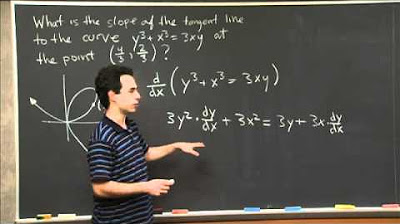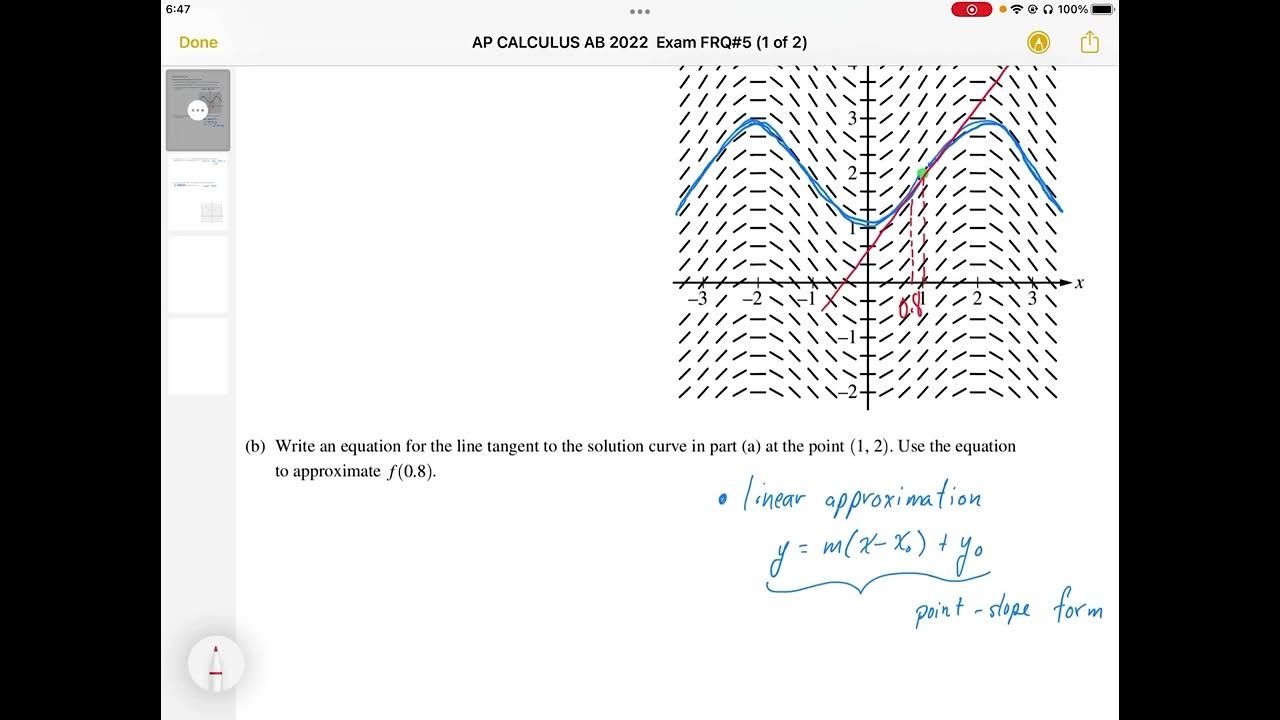Tangent Line to a Polynomial | MIT 18.01SC Single Variable Calculus, Fall 2010
TLDRIn this recitation, Professor Joel Lewis guides students through calculating the tangent line to the curve y = x^3 - x at the point (2, 6). He emphasizes the importance of finding the derivative of the function to determine the slope at a specific point, which in this case is 11 when x = 2. Lewis then demonstrates how to use the point-slope form to derive the equation of the tangent line, offering both the point-slope and slope-intercept forms of the equation as solutions.
Takeaways
- 📚 The lecture is focused on computing derivatives of polynomials and understanding their relationship with tangent lines.
- 🔍 The example given is to find the tangent line to the curve y = x^3 - x at the point (2, 6).
- 📈 The function y = x^3 - x has zeros at x = 0, 1, and -1, and the curve is sketched to visualize the problem.
- 📝 To find the tangent line, the derivative of the function is needed, which will give the slope of the tangent at any point x.
- 🔢 The derivative of y = x^3 - x is calculated as y' = 3x^2 - 1 using the power rule for derivatives.
- ⚠️ It's emphasized that to find the slope of the tangent line at a specific point, the derivative must be evaluated at that point's x-value.
- 🎯 For the given point (2, 6), the slope of the tangent line is found by substituting x = 2 into the derivative, resulting in a slope of 11.
- 📐 With the slope and the point, the point-slope form of the equation of the line is used: y - y0 = m(x - x0).
- 📝 The point-slope form for the tangent line is y - 6 = 11(x - 2).
- 📉 An alternative form, the slope-intercept form, is also provided as y = 11x - 16.
- 💡 The script highlights a common mistake made by students: forgetting to substitute the x-value of the point into the derivative to find the slope at that point.
Q & A
What is the main topic of the lecture?
-The main topic of the lecture is to demonstrate how to compute derivatives of polynomials and understand the relationship between derivatives and tangent lines.
What is the given function in the example?
-The given function in the example is y = x^3 - x.
What is the point at which the tangent line is to be computed?
-The tangent line is to be computed at the point (2, 6).
What is the derivative of the function y = x^3 - x?
-The derivative of the function y = x^3 - x is y' = 3x^2 - 1.
Why is it important to evaluate the derivative at a specific point?
-It is important to evaluate the derivative at a specific point to find the slope of the tangent line at that point, which is necessary for the point-slope form of the line equation.
What is the slope of the tangent line at the point (2, 6)?
-The slope of the tangent line at the point (2, 6) is 11, which is obtained by substituting x = 2 into the derivative y' = 3x^2 - 1.
What is the point-slope form of the equation of a line?
-The point-slope form of the equation of a line is y - y_0 = m(x - x_0), where m is the slope and (x_0, y_0) is a point on the line.
How is the point-slope form of the tangent line derived in the example?
-The point-slope form of the tangent line is derived by substituting the slope (11) and the point (2, 6) into the point-slope equation: y - 6 = 11(x - 2).
What is the slope-intercept form of the equation of a line?
-The slope-intercept form of the equation of a line is y = mx + b, where m is the slope and b is the y-intercept.
How can the equation of the tangent line be rewritten in slope-intercept form?
-The equation of the tangent line can be rewritten in slope-intercept form by rearranging the point-slope form: y = 11x - 22 + 6, which simplifies to y = 11x - 16.
Why is it a common mistake to use the derivative expression as the slope for the tangent line?
-It is a common mistake because the derivative expression represents the slope as a function of x, and one must evaluate this expression at the specific x-value of the point in question to find the actual slope of the tangent line at that point.
Outlines
📚 Introduction to Derivatives and Tangent Lines
In this introductory paragraph, Professor Joel Lewis welcomes students to a calculus recitation session. He briefly mentions the lecture topics on computing derivatives of polynomials and the relationship between derivatives and tangent lines. He then presents a problem to the students: finding the equation of the tangent line to the curve y = x^3 - x at the point (2, 6). He encourages students to pause the video and work on the problem independently before continuing with the solution.
📈 Sketching the Function and Identifying Key Points
Professor Lewis proceeds by sketching a rough graph of the function y = x^3 - x, identifying zeros at x = 0, 1, and -1. He approximates the shape of the curve and marks the point (2, 6) on the graph. He emphasizes the importance of understanding the function's behavior to determine the tangent line at a specific point.
🔍 Deriving the Function and Finding the Slope
The professor explains the process of finding the derivative of the given function, which is y' = 3x^2 - 1, using the power rule for derivatives. He clarifies that the derivative represents the slope of the function at any point x. To find the slope of the tangent line at the point (2, 6), he substitutes x = 2 into the derivative, resulting in a slope of 11.
📉 Calculating the Equation of the Tangent Line
With the slope of the tangent line determined, Professor Lewis uses the point-slope form of a line's equation to find the tangent line at the point (2, 6). He writes the equation as y - 6 = 11(x - 2) and then simplifies it to y = 11x - 16, which is the equation of the tangent line in slope-intercept form. He highlights the common mistake of using the derivative directly as the slope without substituting the point's x-value and stresses the importance of this step in calculus problems.
Mindmap
Keywords
💡Derivative
💡Polynomials
💡Tangents
💡Slope
💡Point-slope formula
💡Powers of x
💡Sum of derivatives
💡Slope at a point
💡Mistake in calculus
💡Slope-intercept form
Highlights
Introduction to the lecture on computing derivatives of polynomials and their relationship with tangent lines.
Invitation to the audience to compute the tangent line to the curve y = x^3 - x at the point (2, 6).
Explanation of the importance of understanding the derivative for finding the slope of a tangent line.
Sketching the function y = x^3 - x to visualize the curve and identify its zeros.
Emphasizing the need to compute the derivative to find the slope of the tangent line at a specific point.
Derivation of the function y = x^3 - x, resulting in y' = 3x^2 - 1.
Clarification that the derivative at a point gives the slope of the tangent line at that point.
Demonstration of calculating the slope of the tangent line at x = 2, resulting in a slope of 11.
Highlighting a common mistake in calculus of using the derivative without substituting the point's x-value.
Introduction of the point-slope formula for a line to find the equation of the tangent line.
Application of the point-slope formula using the point (2, 6) and slope 11 to find the tangent line equation.
Presentation of the tangent line equation in the form y - 6 = 11(x - 2).
Alternative presentation of the tangent line equation in slope-intercept form: y = 11x - 16.
Reinforcement of the correct method for finding the slope of the tangent line at a given point.
Final summary of the process to compute the tangent line to a curve at a specific point.
Transcripts
Browse More Related Video

How To Find The Equation of The Tangent Line With Derivatives

Calculating slope of tangent line using derivative definition | Differential Calculus | Khan Academy

Implicit Differentiation | MIT 18.01SC Single Variable Calculus, Fall 2010

Implicit Differentiation - Finding Equation of Tangent Line

AP CALCULUS AB 2022 Exam Full Solution FRQ#5(a,b)

Equation of a tangent line [IB Maths AI SL/HL]
5.0 / 5 (0 votes)
Thanks for rating: